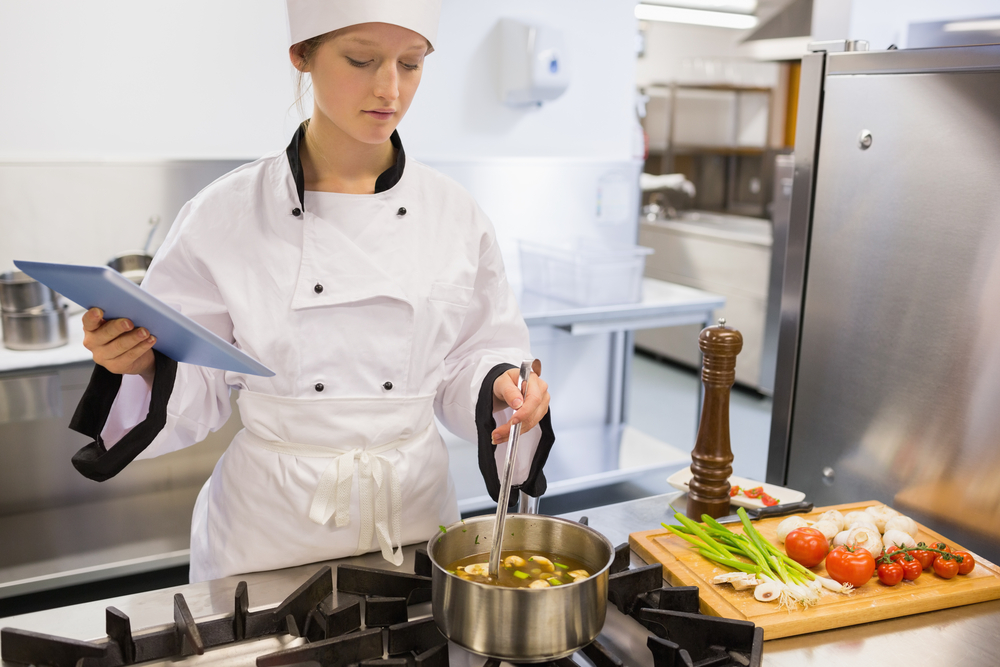Careers: Chef

Chefs plan and develop menus, decide on the day’s speciality and estimate the amount of food needed. They compute the cost of food, purchase food supplies, prepare food or supervise and coordinate the preparation of food by cooks and other kitchen staff and then check the quality of food prepared.
They give instructions on the sizes of the portions and supervise the arrangement of the food on platters and plates. They organize the cleaning of the kitchen and ensure that high-quality service and food are provided at all times, while maintaining hygienic standards.
They may be required to hire and train the cooks who work in the kitchens with them. The ‘Chef de Cuisine’ or head chef is in charge of the kitchen and is also responsible for the preparation of food, cost accounting, for compiling lists and ordering perishable and dry products; and to see to it that all equipment is clean and in working order.
The ‘Sous Chef’ or second chef assists the head chef and the ‘Chef de Partie’ is a departmental head in charge of a team of cooks and kitchen workers. The “Chef de Partie” is responsible for the preparation of all meat dishes and sauces, as well as all vegetables and associated foods such as salads, cold foods, cakes, fruit dishes and various types of soup. This chef also approves every dish that leaves the kitchen and decides what the day’s speciality should be.
Smaller restaurants usually have only one chef or cook, who prepares all the food with the help of a short order cook and one or two kitchen helpers.
Although today’s freezing facilities and microwave ovens allow for partial preparation of dishes beforehand, special dishes require special skills from a chef. Many chefs have earned fame both for themselves and the hotels and restaurants where they work, because of their skill in creating new dishes and improving familiar ones.
Satisfying Aspects
– opportunities to be creative
– working as part of team
– knowing your work contributes to the success of the establishment
– being asked for recipes
– receiving compliments
Demanding aspects
– the pressure and stress of rush hours
– long hours of standing and walking
– working evenings, holidays and weekends
– dealing with dissatisfied or overly critical customers
Requirements
A chef should:
– have a flair for and interest in baking and preparing foodstuffs
– have creative and artistic talent
– have a keen sense of taste and smell
– have physical stamina to stand for hours at a time
– have a high regard for personal hygiene and cleanliness
– be able to use own initiative, with minimum supervision
– have organizational ability, but also be flexible
– be interested in learning and adapting to an ever changing market’s expectations
– work well with others
– work well under pressure
– communicate ideas clearly
– have a good memory and eye-hand coordination
School Subjects
National Senior Certificate meeting degree requirements for a degree course
National Senior Certificate meeting diploma requirements for a diploma course
Each institution will have its own minimum entry requirements.
Compulsory Subjects: English
Recommended Subjects: Hospitality Studies, Physical Sciences, Mathematics, Consumer Studies
Training
Appropriate courses can be followed at universities, universities of technology, FET Colleges, private or correspondence colleges.
Chef and Assistant Chef courses are offered at Northlink, Professional Cookery courses at False Bay and Northlink, Kitchen Skills at False Bay, Food Management / Services at False Bay, VUT and CPUT, Food Technology at DUT, CPUT, TUT and UJ, Catering Studies at Boland, SW Gauteng, Maluti and Vuselela.
Hospitality Management courses are offered by DUT, VUT, UJ, S Cape FET College.
It is important for students to know where their talents and interests lie. This is because some schools focus on innovative cooking skills, whereas others offer a more rounded approach to cooking, service and catering management.
Hotel Industries Training Board (HITB) offers in-service training, including:
– Hotel management (3 years)
– Commercial catering and restaurant management (CBMT)
– IR course for middle management
– Supervisory course
– Facilitator’s course
– Professional cookery (3 years)
– On-the-job instruction course
Several cooking schools offer appropriate training, from one to three year courses.
It is important for students to know where their talents and interests lie. This is because some schools focus on innovative cooking skills, whereas others offer a more rounded approach to cooking, service and catering management.
Employer
– Hotels
– Restaurants
– Guesthouses
– Hospitals
– Schools, universities and universities of technology
– Contract caterers
– Government departments
– Self-employed
Contact
FEDHASA (South African Hotel Association)
2nd Floor NBS Building
310 Oak Avenue
Ferndale, 2194
Tel: (011) 886-2394
Fax: (011) 789-4811
www.fedhasa.co.za
South African Chefs Association (SACA)
P O Box 787584
Sandton, 2146
Tel: (011) 782-7250 Fax: (011) 782-7260
www.saca.co.za





